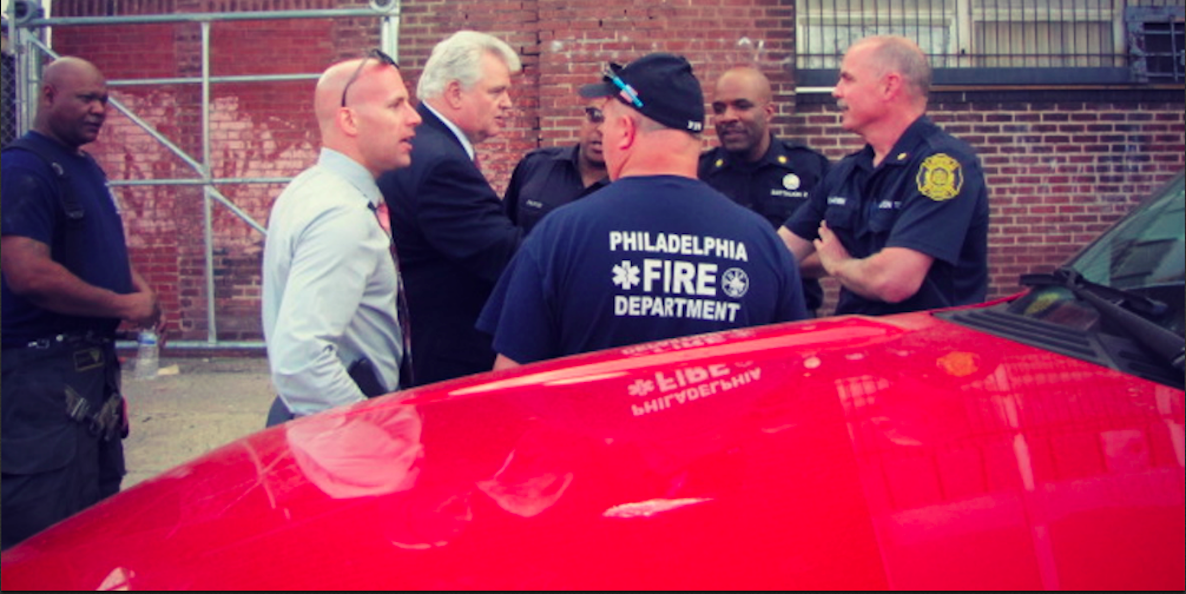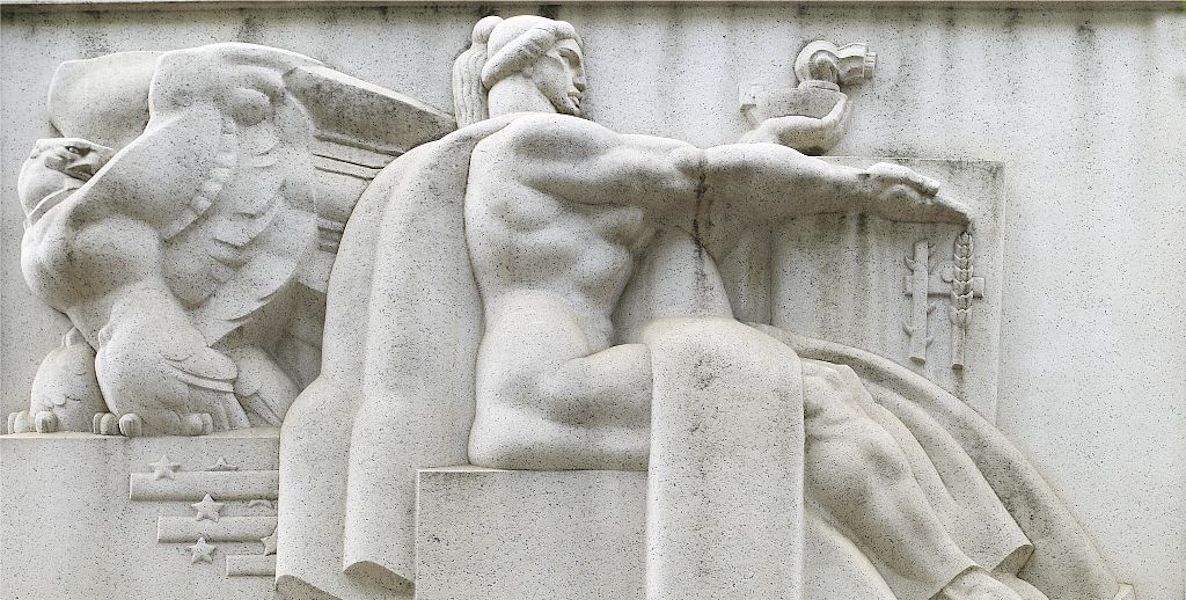In the spring of 1903, muckraking journalist Lincoln Steffens was writing a series of pieces for McClure’s magazine detailing big-city graft and political corruption throughout the United States. He had just come to Philadelphia from Pittsburgh and what he found here struck him as unique.
Steffens’ story about Philadelphia would ultimately be published that July, and its title instantly caused a stir. It’s a headline that has been cited time and again, each time a sleazy pol or behind-the-scenes influence peddler takes high-profile perp walk. In “Philadelphia: Corrupt and Contented,” which would run in his 1904 collection of articles The Shame of the Cities, Steffens wrote: “Philadelphia is proud. Good people there defend corruption and boast of their machine.”
Steffens is long dead and buried. But with every indictment of a public official, with every story of low-level graft or voting shenanigans or just plain public chutzpah, Steffens’s “corrupt and contented” indictment gets trotted out. In many ways, the culture that Steffens discovered here still exists.
The Fix is about trying to dilute the power of a small set of insiders who have long relied for their power on the public’s moral inertia, exactly as Steffens observed a century ago.
Over the next year, we plan on doing what Steffens did, taking you inside the city’s culture of influence—where, often, that which is legal is most insidious—and on a travelogue of other cities to consider the strategies used elsewhere to promote government integrity.
How bad is it? We’ve become inured to the public official perp walk. The last top law enforcement officer in our state, former Attorney General Kathleen Kane, currently wears an ankle bracelet and is staring at jail time. The former top law enforcement official in Philadelphia, former District Attorney Seth Williams, is already there, serving 5 years. Former Congressman Chaka Fattah is serving 10; and last week former State Rep. Leslie Acosta was sentenced to 7 months behind bars. Labor leader John Dougherty remains under federal investigation.
There actually have been too many arrests and investigations and allegations to summarize here. (Which is why we’ve created Philly All-Star corruption cards—because we need to document and shame those who have crossed the lines of legality and decency. So: Trade them with your friends!)
But the seemingly daily drumbeat of headlines focusing on the bad acts of our bad actors actually has had an unintended effect. Rather than lead to outrage and reform, it’s led to cynicism and apathy: They’re all crooks. A pox on all their houses. It’s become clear that we need to do more than just punish or shame the bad actors on our public stage; we also need to reward acts of public integrity with the same zeal we unearth scandal, and we need to shine a light on the entirely legal, yet vastly corrosive, transactional nature of our politics. Nothing will change if we don’t change our culture.
Power in Philadelphia is disproportionately political. That is, business and cultural and media leaders have abdicated their roles as civic referees and have, instead, deferred to elected officials and their cronies.
Steffens said as much in his 1931 autobiography, describing his introduction to the culture of Philadelphia civic life by J.C. Reynolds, a ward leader and proprietor of the St. James Hotel at 13th and Walnut. Reynolds told Steffens—almost boastingly—of how apparatchiks of the local Republican machine had used thugs and gangsters to offset legitimate votes in the last election; not only were sham votes cast for candidates handpicked by shadowy political bosses, but the machine pols registered these “gangster” voters under such names as Ben Franklin and George Washington—just for the ironic kick. In our nonchalance, Steffens detected something different in Philadelphia.
“The novelty was the attitude of this hotel man and of other good citizens of Philadelphia toward their notorious, insulting, cynical political and business crooks,” he wrote. “He and his kind did nothing about it. ‘There is nothing to be done,’ the hotel man said. ‘We have tried reforms over and over again; we have striven to beat this game; and we never got anywhere.’ The reformers I saw took much the same view.”
Certainly, the worst of what Steffens saw over 100 years ago no longer exists. There isn’t any widespread, documented voter fraud or disenfranchisement. But the culture Steffens chronicled still exists, and its legal transgressions might be its most damaging. In 1903, Steffens saw a one-party town run by and for 200 or so insiders that included party bosses, corporate enablers, lawyers, bankers, union toughs, and for-profit, under-the-radar ward leaders. Today, a different party runs a one-party town by and for 200 or so insiders, and it includes party bosses, corporate enablers, lawyers, bankers, union toughs, and for-profit, under-the-radar ward leaders.
It was perfectly legal for Jim Kenney, having run for mayor as a progressive with the avid support of Dougherty, to turn around and name the labor leader’s chiropractor to head the Zoning Board, but Steffens would have seen it as yet more undermining of the public trust and another example of valuing private interests over the common good. (Chiropractor James Moylan eventually stepped down from the Zoning Board, after his home and office were raided by FBI agents investigating Dougherty).
Just as in Steffens’ day, widespread toleration of the status quo pertains. Recent scandals in cities such as Chicago underscore that Philadelphia has no monopoly on municipal corruption. But our shoulder-shrugging response to it seems unique. “The people are not innocent,” Steffens observed of Philadelphia, and so it is today.
Whether it’s legal insider deals like Kenney’s with Dougherty’s chiropractor; the fact that, lo and behold, disgraced cop Ryan Pownall landed on his feet with a patronage job at the Parking Authority; or our elected officials’ penchant for graft, we tolerate ![]() our public shenanigans, sometimes even reveling in them.
our public shenanigans, sometimes even reveling in them.
Our landscape has been dotted with a series of charming, rogue-like characters whose misdeeds never seem to relegate them to political purgatory, and who rarely have been held to account by those institution and business leaders who could rein in their more, uh, colorful impulses. Decades ago, the late ward leader and State Senator Buddy Cianfrani, upon learning that a U.S. Attorney was investigating him, quipped, “If he can’t get anything on me, what kind of investigator is he?” He was also known to brag about how his minions covered his bases all throughout the branches of government.
Cianfrani was convicted of racketeering, mail fraud, obstruction of justice and tax evasion in 1977, and when he got out, he returned to his Boss-like ways, mentoring, for example, a young Vince Fumo, who later, uh, also “went away.” (“I learned from Buddy by being fucked by Buddy,” Fumo once told me, laughing.)
And Cianfrani might not even be the best example of how, in Philly, no misdeed requires so much as a mea culpa. The late Jimmy Tayoun served more than three years after being convicted of accepting bribes as a city councilman, came back, and penned a book of self-help advice for white-collar types who end up behind bars. No one ever washes out of Philly, as Steffens saw when it came to Mayor Sam Ashbridge in the early 1900s; Ashbridge brazenly announced that he wanted but one term and “I shall get out of this office all there is in it for Samuel H. Ashbridge.” Which he did; entering office broke, he left it as a bank president.
Whether it’s legal insider deals like Kenney’s with Dougherty’s chiropractor; the fact that disgraced cop Ryan Pownall landed on his feet with a job at the Parking Authority; or our elected officials’ penchant for graft, we tolerate our public shenanigans, sometimes even reveling in them.
Then, as now, power in Philadelphia is disproportionately political. That is, business and cultural and media leaders have abdicated their roles as civic referees and have, instead, deferred to elected officials and their cronies. We’ve enabled the inside dealers just as Ashbridge was enabled a century ago.
Again, Steffens said it so well: “Philadelphia was one of the hotbeds of ‘knownothingism,’” he wrote, arguing that the heads of educational and charitable institutions “‘go along,’ as they say in Pennsylvania, in order to get appropriations from the state and land from the city. They know what is going on, but they do not join reform movements. The provost of the University of Pennsylvania declined to join in a revolt because, he said, it might impair his usefulness to the university. And so it is with…lawyers who want briefs, real estate dealers who like to know in advance about public improvements, and real estate owners who appreciate light assessments.”
So that’s the all-important context for “The Fix,” which will deconstruct the self-interested political status quo for you, and focus on constructive ways we can make things better. We’ll look at governments across the globe that, led by young reformers, are experimenting with ways to create cultures of integrity; we’ll explore how citizens are pushing for City Council term limits in places like Arlington, Texas, and what that might look like here; and we’ll bring together some old-school movers and shakers with some wide-eyed millennials to look at our Home Rule Charter with an eye toward reforming it.
In effect, The Fix, like the the experiment of The Citizen itself, is about trying to dilute the power of a small set of insiders who have long relied for their power on the public’s moral inertia, exactly as Steffens observed a century ago. Indeed, it wasn’t the corruption, per se, that bewildered Steffens; it was the shamelessness of it. “Technically,” Steffens wrote, “it looked like bad politics.”
A local boss privately explained why it wasn’t: “We reasoned that if we [did exactly as we wanted] fast enough, one-two-three—one after the other—the papers couldn’t handle them all, and the public ![]() would be stunned and— give up. … We know that public despair is possible and that that is good politics.”
would be stunned and— give up. … We know that public despair is possible and that that is good politics.”
Lincoln Steffens was not naïve. He knew how the world worked, and he painted men of power in decidedly empathetic and unsentimental hues. Years ago, I found myself in a telling heart-to-heart with none other than that power broker of all power brokers, Boss Bob Brady. He was bemoaning the levels of calculus and strategy and deal-making that go into getting things done here. “I’ve never done anything illegal in this job,” he said. “But you do do some things that are wrong.”
In fairness, I suspect Brady has helped more people than even he knows, and that, in the end, he’s done more good than bad. But here’s the thing: Steffens anticipated Brady’s moment of moral ambiguity, too: “I have had many similar experiences since with big, bad men, and I find that if they are big enough and bad enough, they seem to be as eager to do great good as great evil. They simply are not asked to do good.”
So that’s what we’re going to do in The Fix: Ask those who have it in their power to Simply. Do. Good. Maybe, in the act of the asking, lies the key to finally ridding ourselves of that “corrupt and contented” label, which has become a kind of self-fulfilling prophecy.
The Fix is made possible through a grant from the Thomas Skelton Harrison Foundation. The Harrison Foundation does not exercise editorial control or approval over the content of any material published by The Philadelphia Citizen.









